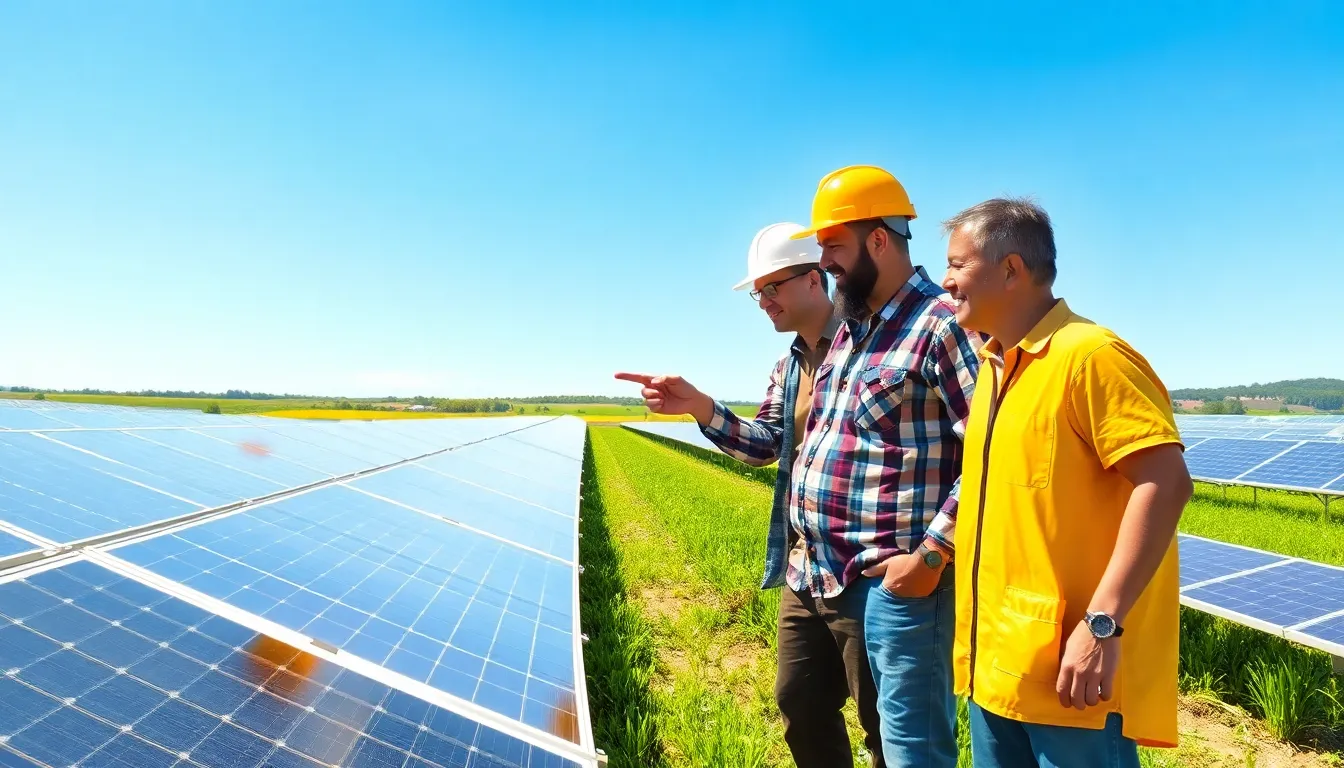In a world where climate change feels like that one friend who just won’t leave the party, green tech innovations are stepping up to save the day. Imagine a future where your toaster runs on sunshine and your car runs on leftover pizza. It might sound like a sci-fi movie, but these groundbreaking technologies are already reshaping our planet for the better.
Table of Contents
ToggleOverview of Green Tech Innovations
Green tech innovations play a crucial role in addressing climate change challenges. These advancements integrate sustainable practices across various sectors, significantly reducing carbon footprints. Renewable energy systems, such as solar panels and wind turbines, harness natural resources to generate clean electricity.
Energy-efficient appliances, including LED lighting and smart thermostats, minimize energy consumption in homes and businesses. Electric vehicles (EVs) contribute to cleaner transportation, producing fewer emissions compared to traditional cars. Innovations in battery technology enhance storage capabilities, making renewable energy more viable.
Waste-to-energy systems convert organic waste into usable energy, effectively tackling landfill issues while generating power. Sustainable building materials, like bamboo and recycled steel, promote greener construction practices. Urban farming technologies inspire local food production and reduce the carbon footprint associated with transportation.
Aquaponics and vertical gardens represent innovative ways to grow food sustainably. These methods make use of limited space while ensuring fresh produce is available year-round. Water conservation technologies focus on minimizing waste through advanced irrigation and filtration systems.
Investments in green technology create not only environmental benefits but also economic opportunities. Job creation in renewable energy sectors and eco-friendly manufacturing leads to robust growth. As awareness of climate change increases, the demand for green tech innovations continues to rise.
Innovations targeting air and water purification utilize cutting-edge technologies to enhance public health. Smart grids improve energy distribution and reliability, ensuring optimal use of renewable resources. Overall, green tech innovations form a vital part of strategies aimed at achieving a sustainable future.
Key Areas of Innovation

Green tech innovations focus on various key areas that significantly contribute to sustainability and environmental health.
Renewable Energy Sources
Solar power leads the charge in renewable energy sources, harnessing sunlight to generate electricity for homes and businesses. Wind turbines capture wind energy, providing an efficient means of producing clean power. Hydropower systems convert flowing water into energy, contributing to a balanced energy mix. Geothermal energy exploits the Earth’s heat for electricity and heating applications. Together, these technologies play a critical role in decreasing dependency on fossil fuels and reducing greenhouse gas emissions.
Sustainable Transportation
Electric vehicles revolutionize transportation, offering a cleaner alternative to traditional gasoline engines. These cars produce zero tailpipe emissions, significantly lessening urban air pollution. Public transportation systems also undergo transformation, integrating electric buses and trains to reduce carbon footprints. Car-sharing and ride-sharing services promote more efficient space and resource usage. Ultimately, these advancements encourage a shift towards sustainable mobility solutions and cleaner urban environments.
Waste Management Solutions
Waste-to-energy systems convert organic waste into energy, efficiently reducing landfill contributions while generating power. Innovative recycling programs enhance material recovery, promoting a circular economy that minimizes waste. Composting initiatives facilitate nutrient-rich soil production from organic matter, benefiting agriculture. Smart waste management technologies utilize IoT devices for real-time tracking of waste levels, optimizing collection routes. These solutions collectively address waste issues by transforming waste into valuable resources.
Impact on Environment and Society
Green tech innovations significantly influence both the environment and society. Their potential reshapes industries and promotes sustainability, addressing critical challenges posed by climate change.
Carbon Footprint Reduction
Carbon footprint reduction remains a primary focus of green technologies. Renewable energy sources, such as solar and wind, deliver clean power, drastically cutting greenhouse gas emissions. In fact, transitioning to renewable energy can lower emissions by up to 70%. Energy-efficient products, including LED bulbs and smart thermostats, efficiently diminish energy usage in households. Electric vehicles play a crucial role too, producing zero tailpipe emissions. Innovations in waste management convert organic waste into energy, further decreasing overall carbon footprints. Overall, these advancements contribute to a cleaner atmosphere and promote environmental health.
Economic Benefits
Economic benefits arise through investments in green technology. The renewable energy sector anticipates job growth, creating approximately 1.3 million new positions by 2030. Companies specializing in sustainable practices gain competitive advantages and attract eco-conscious consumers. Clean technology often leads to reduced operational costs, allowing businesses to allocate resources more efficiently. Moreover, the construction industry sees a rise in demand for sustainable materials, bolstering local economies. Advanced technologies promote innovation, making economies more resilient and adaptable. These economic incentives enhance quality of life while fostering a sustainable future.
Challenges in Adoption
Adoption of green tech innovations faces several challenges that can hinder progress.
Technological Hurdles
Technological challenges delay the integration of green technologies. High costs associated with initial investments often deter businesses. Limited infrastructure for renewable energy storage affects efficiency. Research and development must continue to improve performance and lower prices. Complicated installation processes complicate wider use among consumers. To address these issues, advancements in technology can enhance both accessibility and reliability.
Regulatory and Policy Issues
Regulatory frameworks can significantly impact the adoption of green tech. Inconsistent policies across regions create confusion for developers and investors. Regulatory hurdles often slow down project approvals and lead to higher costs. Lack of incentives for adopting sustainable practices reduces motivation among businesses. Clarity in regulations can promote stronger support for green technology investments. Streamlining policies will encourage innovation and facilitate market entry for new solutions.
Future Trends in Green Tech
Emerging trends in green technology indicate a surge in renewable energy adoption. Solar power and wind energy generation are set to dominate the market, with projections showing a potential 70% reduction in carbon emissions through these sources. Urban centers are investing in smart energy grids, enhancing efficiency and reliability in energy distribution.
Advancements in battery technology support renewable energy storage solutions. High-capacity batteries from companies like Tesla enhance the feasibility of solar and wind power, mitigating supply challenges. Electric vehicles are gaining traction with improvements in charging infrastructure and range, encouraging wider adoption across diverse demographics.
Waste management technologies are evolving, reflecting a shift toward circular economy models. Waste-to-energy systems convert organic material into usable energy, transforming landfill waste into valuable resources. Recycling programs become more innovative, promoting community engagement while minimizing landfill reliance.
Sustainable construction practices integrate new materials, such as recycled plastics and bamboo. These materials provide environmentally friendly alternatives, fostering greener building initiatives. Smart building technologies also improve energy efficiency, automatically optimizing heating, cooling, and lighting.
Water conservation and purification technologies are crucial for addressing global water shortages. Advanced filtration systems and rainwater harvesting methods aid in sustainable water resource management. Urban farming solutions create localized food production, enhancing food security while reducing transportation emissions.
Job creation remains a significant aspect of green tech innovations. The renewable energy sector anticipates approximately 1.3 million new jobs by 2030, driving economic growth while addressing environmental challenges. As these trends continue, clarity in regulations and supportive policies will further enhance accessibility and investment in green technologies.
Green tech innovations are reshaping the landscape of sustainability and environmental responsibility. These advancements not only combat climate change but also create economic opportunities and enhance quality of life. As society increasingly embraces renewable energy sources and sustainable practices, the potential for a greener future becomes more tangible.
The journey toward a sustainable world will involve overcoming challenges such as infrastructure limitations and regulatory hurdles. However with ongoing investments and technological advancements, the path forward appears promising. The commitment to integrating green technologies across various sectors is essential for fostering a resilient and thriving planet.









